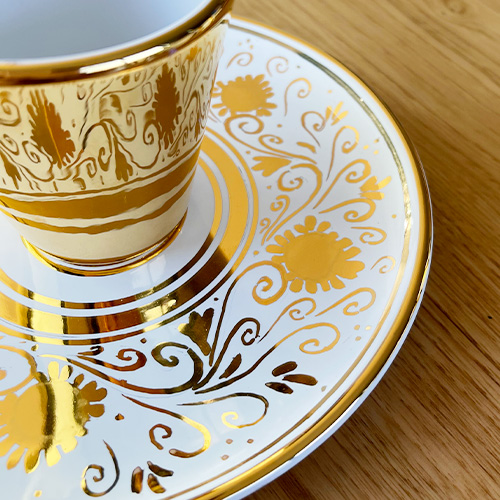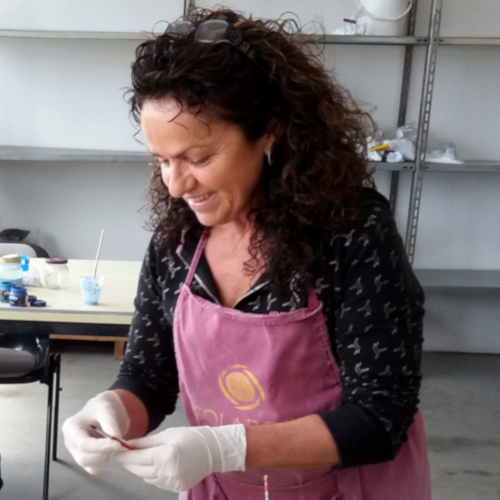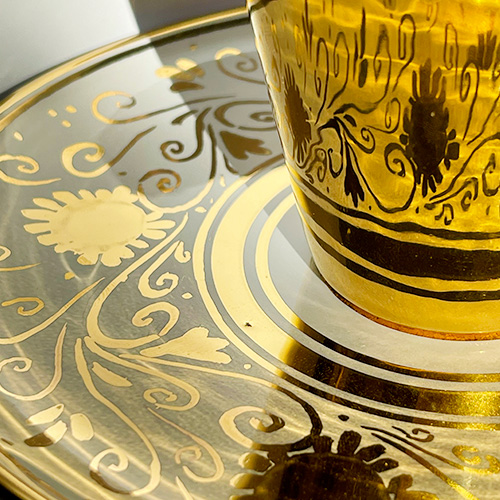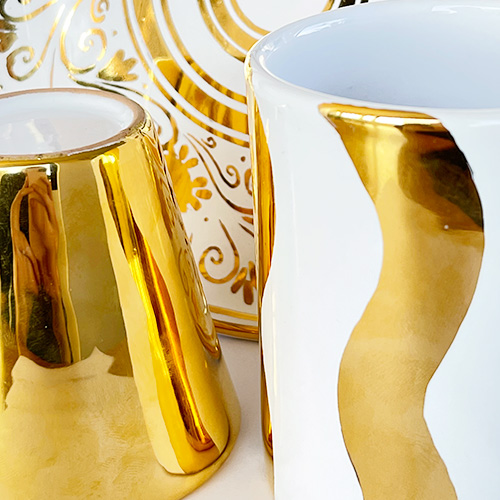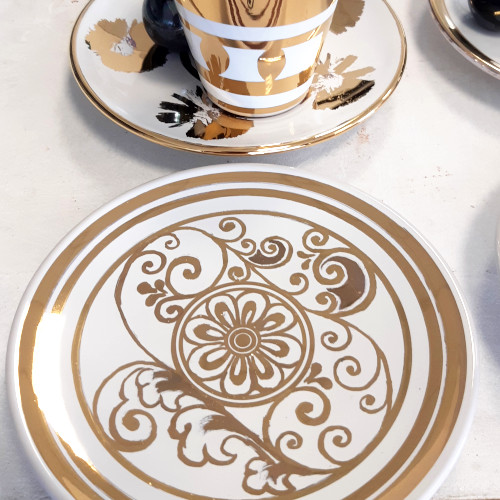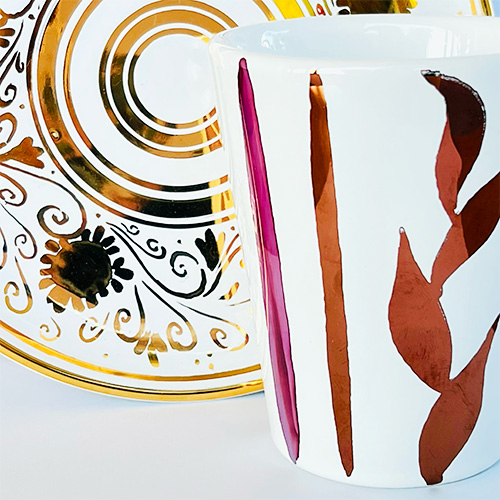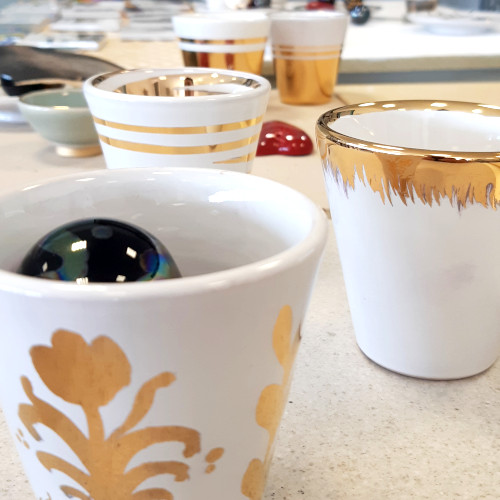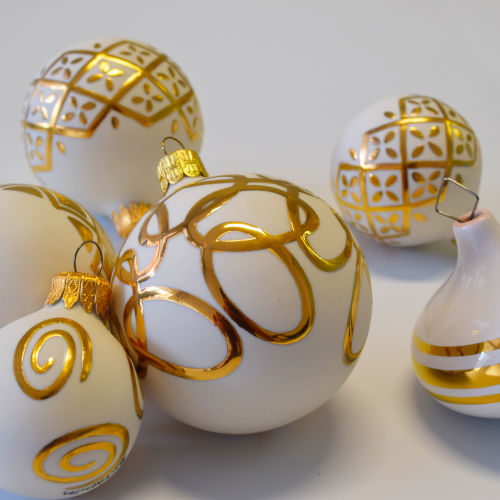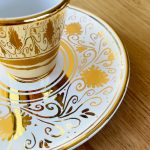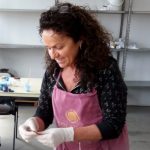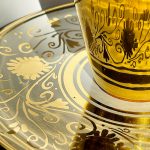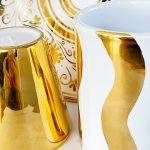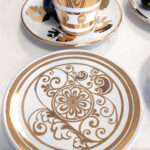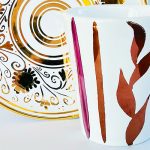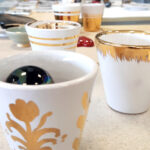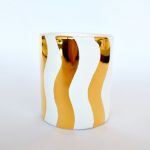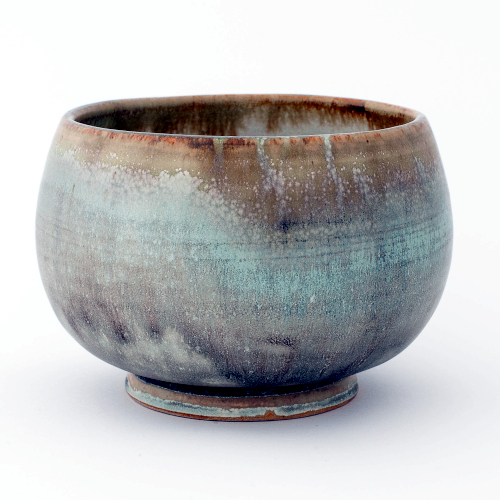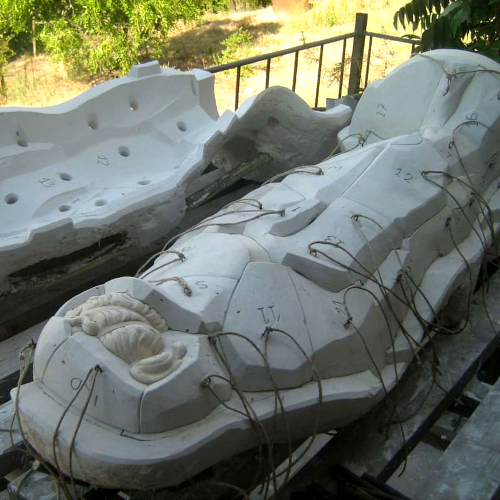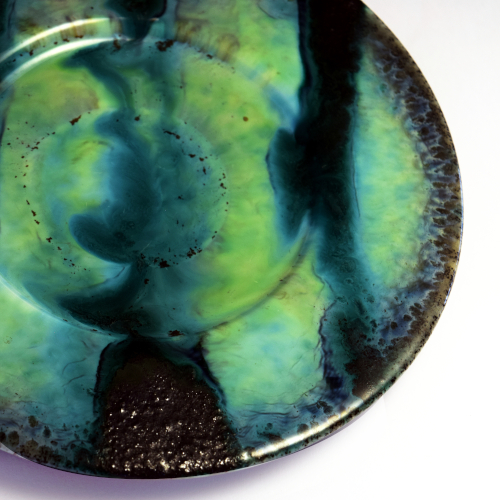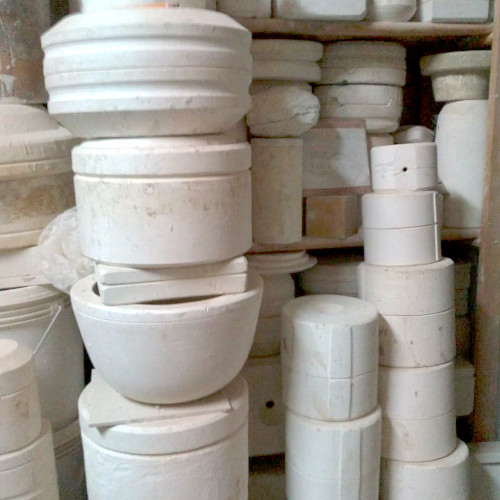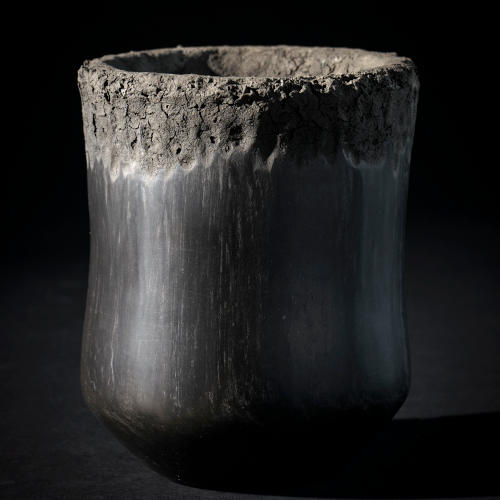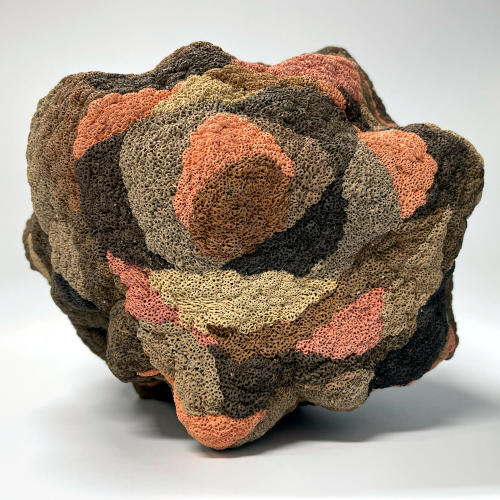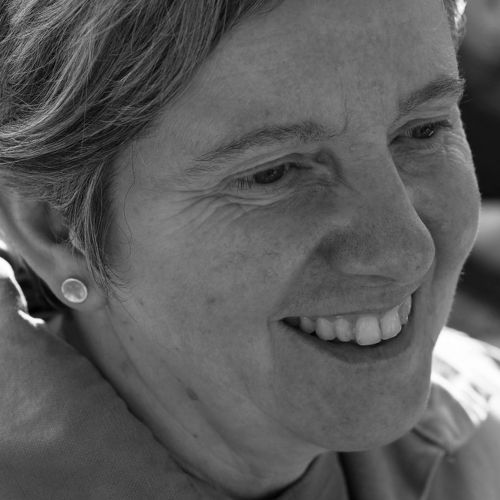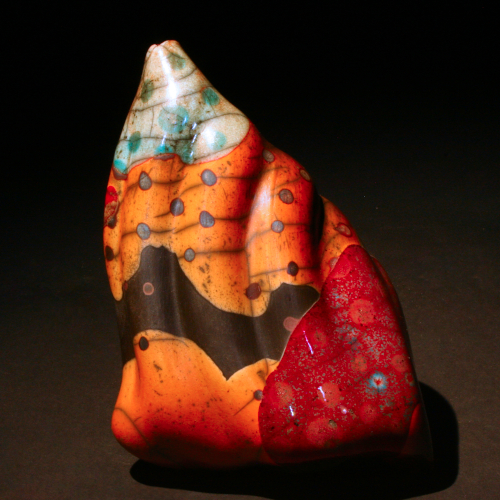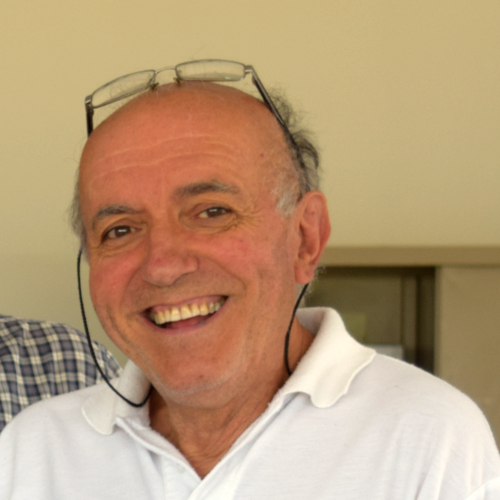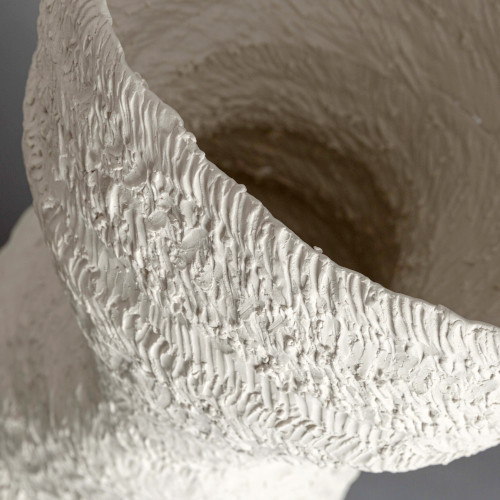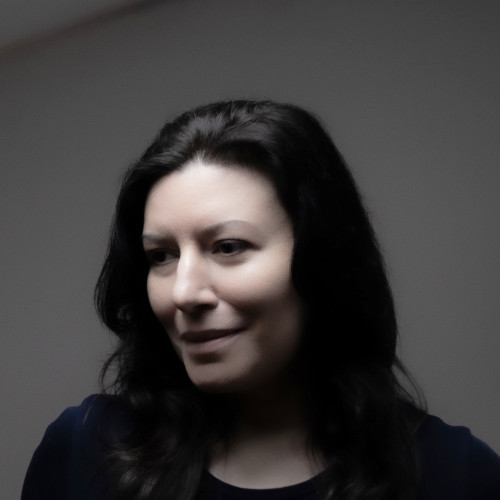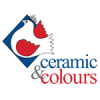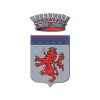DECORATION WITH GOLD, LUSTRES AND COLOURS | Vilma Bosi
04-05 May 2024
Learn how to work with precious and third-fire colours, easy application, decoration and firing of ceramics.
Third-firing decoration with gold, lustres and colours is a fascinating art that if well managed can be much less expensive than expected. Course participants will learn a correct approach to the technique so as not to waste time and resources. The course will begin with the knowledge of precious metals (gold and lustres) and their peculiarities, and will then move on to the preparation of the objects to be decorated, up to their application through personal decoration exercises. The course will continue with third-firing colours, and the various steps necessary to personalise already glazed objects with decorations (fillets, lettering, etc.) and backgrounds will be explored.
Vilma Bosi
In 1978 she began his work as a ceramist in Antonietta Mazzotti’s workshop where he became passionate and specialised in the decoration of ceramic artefacts. During her career, she collaborated with the Diva ceramics industry where she was in charge of the hand-decorated department and laboratory. Over time, her specialisation became the third fire (mainly gold and precious) thanks to which she collaborated with various artists and craftsmen in Italy. Among the most important are: La bottega Gatti, Fos Ceramiche, Padovani Ceramiche, Laboratorio Pesaro, Coralla Maiuri and Ceramic & Colours. In 2011, she was hired by Ceramic & Colours as laboratory manager, a role she still holds today. Since 2018 she has been teaching at the Faenza Art Ceramic Center.
The 11-hour course starts at 9 a.m. and ends at 5 p.m. on Saturday and starts at 9 a.m. and ends at 1 p.m. on Sunday.
Included in the course:
11 hours of teaching | the materials needed for the course | the firings | nr. 1 brunch meal (breakfast and lunch)
Teacher: Vilma Bosi
Language: Italian
Download the full program in pdf
To confirm your inscription you have to make a bank transfer of a deposit or the total amount.
Related products
CERAMIC MAZE: THE GLAZES | Vilma Bosi
18-19 May 2024
How much water should be added when preparing the glaze? How should you proceed to make a good application? In this course we want to introduce you to glazing ceramic artefacts by providing some basic specific skills. We will start with the knowledge of the products (Glazes, Transparent glazes, Colours, etc.) and their peculiarities, we will begin with how to proceed in their preparation and we will end with the opportunity to try out the main glazing techniques and a guide to ceramic firing. In particular, we will deal with application by immersion, spraying with an airbrush and brush glazing with the aid of special vehicles that allow for better application. We will present the necessary steps to obtain effects in the coatings also with applications in several layers that will be made on clay supports, already fired, provided by the organisation.
Vilma Bosi In 1978 she began his work as a ceramist in Antonietta Mazzotti's workshop where he became passionate and specialised in the decoration of ceramic artefacts. During her career, she collaborated with the Diva ceramics industry where she was in charge of the hand-decorated department and laboratory. Over time, her specialisation became the third fire (mainly gold and precious) thanks to which she collaborated with various artists and craftsmen in Italy. Among the most important are: La bottega Gatti, Fos Ceramiche, Padovani Ceramiche, Laboratorio Pesaro, Coralla Maiuri and Ceramic & Colours. In 2011, she was hired by Ceramic & Colours as laboratory manager, a role she still holds today. Since 2018 she has been teaching at the Faenza Art Ceramic Center.
The 14-hour course starts at 9 a.m. and ends at 5 p.m. on Saturday and starts at 9 a.m. and ends at 4-5 p.m. on Sunday. Included in the course: 14 hours of teaching | the materials needed for the course | the firings | 2 brunch meals (breakfast and lunch) | a gift box (with samples of the materials used during the course) Teacher: Vilma Bosi Language: Italian Download the full program in pdfTo confirm your inscription you have to make a bank transfer of a deposit or the total amount.
THE BASES OF PLASTER MOULDS | Marco Malavolti
22-23-24 March 2024
Reproducing a shape for large or small productions, but also creating unique objects from a casting or pressure mould, simplifying the working processes; this is the dream of many ceramists. The teacher Marco Malavolti will present in an effective, simple and creative way an intensive programme on the basic techniques needed to make multi-part moulds for casting and pressure moulding. Participants will work on objects provided by the organisation on which the moulds will be made. The objects are designed to see different complexities and moulding techniques.
Marco Malavolti After graduating at Ballardini in Faenza, he started working in 1997 as a craftsman and immediately started collaborating with the International Museum of Ceramics, producing several works. At the same time, he also collaborated with Elena Agnini in Munich where he specialised in restoration. Also in 1997, he began teaching at the "T. Minardi" School where he held courses in basic and advanced ceramics. Over the next five years he specialised in moulding, becoming a reference point in Italy on this subject. In 2002, he opened Manifatture Sottosasso, structuring various activities: his own production linked to the world of design, collaborations with artists and galleries (the most important include: Garutti Alberto, Siedlecki Namsal, Previti Riccardo, Simeti Francesco, Ornaghi e Prestinari, Galleria Minini, Galleria Zero, Galleria Continua, Fondazione Officine Saffi, Galleria Nilufar). Also, production for companies and collaborations with museums where he mainly works on moulding (among the most important museums are: Museo Internazionale delle Ceramiche in Faenza, Museo di San Domenico and Museo Gypsotheca Antonio Canova and Museo Carlo Zauli).
The 20-hour workshop lasts from 9.00 to 17.00 on Friday and Saturday and from 9.00 to 16.00 on Sunday.
Included in the Workshop cost: 20 hours of teaching | all the necessary materials | perfectly equipped studio | no. 3 brunch meals (breakfast and lunch) Teacher: Marco Malavolti Download the full program in pdfTo confirm your inscription you have to make a bank transfer of a deposit or the total amount.
CERAMIC MAZE: THE GLAZES | Vilma Bosi
16-17 March 2024
How much water should be added when preparing the glaze? How should you proceed to make a good application? In this course we want to introduce you to glazing ceramic artefacts by providing some basic specific skills. We will start with the knowledge of the products (Glazes, Transparent glazes, Colours, etc.) and their peculiarities, we will begin with how to proceed in their preparation and we will end with the opportunity to try out the main glazing techniques and a guide to ceramic firing. In particular, we will deal with application by immersion, spraying with an airbrush and brush glazing with the aid of special vehicles that allow for better application. We will present the necessary steps to obtain effects in the coatings also with applications in several layers that will be made on clay supports, already fired, provided by the organisation.
Vilma Bosi In 1978 she began his work as a ceramist in Antonietta Mazzotti's workshop where he became passionate and specialised in the decoration of ceramic artefacts. During her career, she collaborated with the Diva ceramics industry where she was in charge of the hand-decorated department and laboratory. Over time, her specialisation became the third fire (mainly gold and precious) thanks to which she collaborated with various artists and craftsmen in Italy. Among the most important are: La bottega Gatti, Fos Ceramiche, Padovani Ceramiche, Laboratorio Pesaro, Coralla Maiuri and Ceramic & Colours. In 2011, she was hired by Ceramic & Colours as laboratory manager, a role she still holds today. Since 2018 she has been teaching at the Faenza Art Ceramic Center.
The 14-hour course starts at 9 a.m. and ends at 5 p.m. on Saturday and starts at 9 a.m. and ends at 4-5 p.m. on Sunday. Included in the course: 14 hours of teaching | the materials needed for the course | the firings | 2 brunch meals (breakfast and lunch) | a gift box (with samples of the materials used during the course) Teacher: Vilma Bosi Language: Italian Download the full program in pdfTo confirm your inscription you have to make a bank transfer of a deposit or the total amount.
THE BASES OF PLASTER MOULDS | Marco Malavolti
27-28-29 September 2024
Reproducing a shape for large or small productions, but also creating unique objects from a casting or pressure mould, simplifying the working processes; this is the dream of many ceramists. The teacher Marco Malavolti will present in an effective, simple and creative way an intensive programme on the basic techniques needed to make multi-part moulds for casting and pressure moulding. Participants will work on objects provided by the organisation on which the moulds will be made. The objects are designed to see different complexities and moulding techniques.
Marco Malavolti After graduating at Ballardini in Faenza, he started working in 1997 as a craftsman and immediately started collaborating with the International Museum of Ceramics, producing several works. At the same time, he also collaborated with Elena Agnini in Munich where he specialised in restoration. Also in 1997, he began teaching at the "T. Minardi" School where he held courses in basic and advanced ceramics. Over the next five years he specialised in moulding, becoming a reference point in Italy on this subject. In 2002, he opened Manifatture Sottosasso, structuring various activities: his own production linked to the world of design, collaborations with artists and galleries (the most important include: Garutti Alberto, Siedlecki Namsal, Previti Riccardo, Simeti Francesco, Ornaghi e Prestinari, Galleria Minini, Galleria Zero, Galleria Continua, Fondazione Officine Saffi, Galleria Nilufar). Also, production for companies and collaborations with museums where he mainly works on moulding (among the most important museums are: Museo Internazionale delle Ceramiche in Faenza, Museo di San Domenico and Museo Gypsotheca Antonio Canova and Museo Carlo Zauli).
The 20-hour workshop lasts from 9.00 to 17.00 on Friday and Saturday and from 9.00 to 16.00 on Sunday.
Included in the Workshop cost: 20 hours of teaching | all the necessary materials | perfectly equipped studio | no. 3 brunch meals (breakfast and lunch) Teacher: Marco Malavolti Download the full program in pdfTo confirm your inscription you have to make a bank transfer of a deposit or the total amount.
BLACK CERAMIC, CLAY OF ETRURIA | Gabriele Tognoloni
22-23 June 2024
Bucchero is a type of fine and very light black ceramic produced by the Etruscans to make vases. The integral black monochrome is the most striking feature of this type of pottery and the colouring is achieved by a special firing process. Bucchero was used in Etruria from the mid 7th century BC to the first half of the 5th century BC.
Gabriele Tognoloni Born in Gubbio in 1973 and graduated in Sculpture from the 'Pietro Vannucci' Academy of Fine Arts. He leads Unico, in the city of Gubbio, an atelier and gallery where his artistic experience takes shape in ceramics that reveal not only their link with local artistic craft traditions and the genius loci, but also with the direct and indirect input received from some of the most important personalities of Italian and international visual research, reinterpreting these suggestions according to his own highly personal and immediately recognisable language. Many art critics have written about his work, including Italo Tomassoni, Aldo Iori and Antonio Carlo Ponti. Recent exhibitions include one-man shows at the Galleria "lalineaartecontemporanea" in Rome (2016) and at the Centro per l'Arte Contemporanea "La Rocca" in Umbertide (2020), the group show "origine/presente" at Atelier Schwab in Wertheim, Germany (2018), an artistic residency at Atelier A in Apricale (2018), the "Progetto Italia" in collaboration with the artist Alberto Gianfreda at Casa Testori in Milan (2021) and the "Grand tour Limonaia".
The 14-hour course starts at 9 a.m. and ends at 5 p.m. on Saturday and starts at 9 a.m. and ends at 4 p.m. on Sunday.
Included in the course: 14 hours of teaching | the materials needed for the course | the firings | nr. 2 brunch meals (breakfast and lunch) Teacher: Gabriele Tognoloni Language: Italian and English Scarica il programma in formato pdf To confirm your order, you must pay the deposit or the full amount by following the procedure below.TOUCHING TO SEE | Nathalie Doyen
15-16-17 November 2024
This course includes a practical and a theoretical part. The teacher Nathalie Doyen will teach a technique inspired by nature (such as lichens or molluscs adhering to a rock) and through repetitive gestures will lead the participants to a meditative concentration necessary to develop wonderful textures. During this course, the tactile qualities and velvety colours of clay will be examined. Participants will have the opportunity to make both a sample and small objects by practising the technique of artist and teacher Nathalie Doyen. The lessons are totally practical in addition to a theoretical chapter, firing and materials and a DPF (Frequently Asked Questions) session.
Nathalie Doyen Nathalie Doyen was born in Algiers in 1964. She has been exhibiting in Belgium and abroad since 1987. She has been an artist in residence in France, Portugal, Italy, China and Quebec. She teaches ceramics at the Académie des Beaux-Arts in Namur, Belgium. Works on permanent display in Belgium: in Brussels, at the Galerie de l'Ô ; in Mons at the WCC-BF; in Morlanwelz at the Musée Royale de Mariemont. IN QUEBEC: in the Bois de Belle-Rivière regional park. IN CHINA: at the FuLe International Ceramics Art Museum, the FLICAM, Fuping and the "Bien dans son Assiette" commission. Member of the Collège des Alumni de l'Académie Royale de Belgique. Member of Smart asbl; Member of the World Craft Council - French-speaking Belgium. From 1983 to 1987: training at the Académie des Beaux-Arts in Tournai X, under the guidance of Francis Behets and Richard Owzcarek.
The 20-hour workshop lasts from 9.00 to 17.00 on Friday and Saturday and from 9.00 to 16.00 on Sunday.
Included in the Workshop cost: 20 hours of teaching | all the necessary materials | firings | nr. 3 brunch lunch | a box with the samples of the materials used during the workshopTeacher: Nathalie Doyen Languages: English, Italian, French
Download the full program in pdf
To confirm your inscription you have to make a bank transfer of a deposit or the total amount.
SWEET RAKU WITH LUSTRES | Giovanni Cimatti
08-09 June 2024
Sweet Raku is an idea that Giovanni Cimatti came up with in the late 1990s and which differs from so-called Raku in that it has reduced fumigation and the use of chamotte-free clays.
Giovanni Cimatti's sweet raku in some of its declinations. During the course, forms will be made that simultaneously and in a single firing will have the orange colour of 'sealed earths', the transparencies of copper and non-copper crystallines, the lustres in copper reduction in gas kiln firing and the black of Raku smoke.
Giovanni Cimatti Giovanni Cimatti was a teacher at the Art Institute in Siena, director of the 'T. Minardi' School of Drawing and Plastic Art in Faenza and teacher at the State Art Institute for Ceramics in Faenza. He began his artistic activity in the 1970s, developing a personal research on the relationship between form and surface by reworking various techniques such as sangam clay decorations, raku, decalcomania, and terra sigillata, and for years he has also been interested in high temperature. He has been invited to important international ceramic art exhibitions, has held solo exhibitions by invitation in Belgium, Japan, Holland, Korea and Switzerland and has participated in cultural exchanges in France, Japan and Germany. He has had solo exhibitions: at the Museum of Contemporary Art at Kyungshung University in Pusan, Korea, at the Ceratekno Gallery in Toki City, Japan, and at the Museo Civico Archeologico in Bergamo.
The 14-hour course starts at 9 a.m. and ends at 5 p.m. on Saturday and starts at 9 a.m. and ends at 4 p.m. on Sunday.
Included in the course: 14 hours of teaching | the materials needed for the course | the firings | 2 brunch meals (breakfast and lunch) | a gift box (with samples of the materials used during the course) Teacher: Giovanni Cimatti Download the programme in pdf format To confirm your purchase, you must pay the deposit or the full amount by following the procedure below.THE SHAPES OF PORCELAIN | Etra Masi
Porcelain is a material with many qualities: transparency, whiteness, hardness; to enhance them is to have understood its nature. In this course, different techniques will be addressed, the first step towards being able to move freely within the production processes of porcelain. Casting, plastic modelling, moulding and glazing are the bases from which both objects of use and sculptural masses can be created. Porcelain in liquid form and in the plastic state will be worked with or without the aid of plaster moulds into small shapes, analysing for each phase: time, criticality and potential. Each participant, at the end of the course, will have broadened and clarified his or her knowledge of the physical and technical properties of 'white gold' and will be able to choose the working method most suited to his or her imagination.
Etra Masi He graduated in Sculpture from the Academy of Fine Arts in Naples, where he expanded on the theme of "contaminations" and investigated the relationship between sculpture and architecture. When he arrived in Faenza in 2015, he came into contact with the ceramic tradition, deepening his knowledge of craft techniques. Porcelain becomes his material of choice, he builds his sculptures by modelling them by hand, everything revolves around the enhancement of the tactile dimension, the gesture writes the sign. Her work is featured at trade fairs, exhibitions and international art competitions. In 2021 she is selected for The Blanc de Chine International Ceramic Art Award in Hangzhou Winland Center, China; in 2019 she receives an Honourable Mention for the International Biennial of Ceramic Art of Aveiro, Portugal.
The 20-hour workshop lasts from 9.00 to 17.00 on Friday and Saturday and from 9.00 to 16.00 on Sunday.
Included in the Workshop cost: 20 hours of teaching | all the necessary materials | firings | nr. 3 brunch lunch | a box with the samples of the materials used during the workshopTeacher: Etra Masi Languages: English, Italian
Download the full program in pdf
To confirm your inscription you have to make a bank transfer of a deposit or the total amount.

